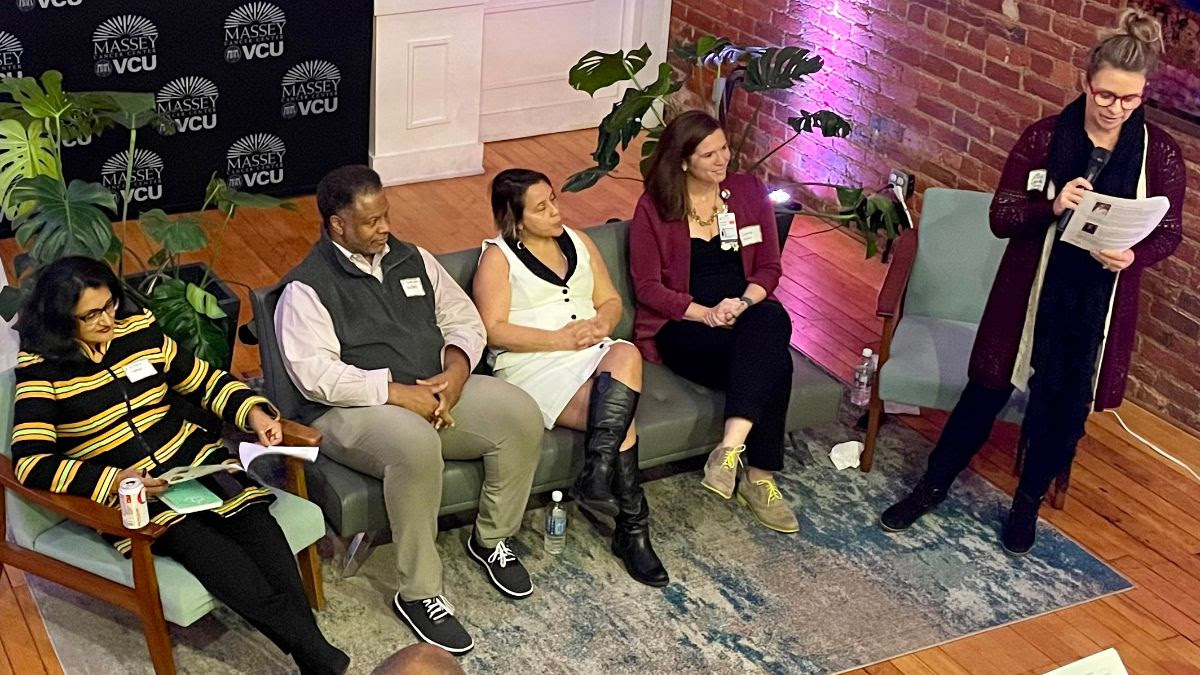Latest News
Research & Innovation, Community Engagement
Massey’s “On the Road to Trust” series highlights LGBTQIA+ cancer disparities
Dec 9, 2022

Community stakeholders joined VCU Massey Cancer Center on Dec. 2 to share ideas about how to better serve the LGBTQIA+ population. It was part of Massey's “On the Road to Trust” symposium series, which launched in 2022 to create community-centered gatherings to facilitate conversations about cancer equity.
Opening remarks were provided by Leslie Randall, M.D., MAS, Massey’s director of gynecologic oncology and Dianne Harris Wright professorship for obstetrics-gynecology (OB-GYN) oncology research.
“Many people are underserved because frankly we have not met their needs as a cancer community,” Randall stated. “That’s why we need to open these safe spaces, have these conversations and offer each other grace.”
Panelists included Robert A. Winn, director and Lipman chair in oncology at Massey; Jennifer Doorey, M.D., assistant professor of OB-GYN at the University of Virginia (UVA); and Mandi Pratt-Chapman, Ph.D., associate director of Community Outreach, Engagement and Equity at the George Washington (GW) Cancer Center.
Panel moderator was Archana A. Pathak, Ph.D., special assistant for programs and initiatives and interim director of the Q Collective at VCU.
“I applaud Massey for recognizing the importance of having the conversation with the community instead of having a top-down model to determine what our community needs,” Pathak said. “I hope this becomes a standard. We don’t expect you to have the answers, but we do expect you to do the work to get the answers.”
The panelists dispelled myths perpetuated by some providers that can lead to lower screening rates and poorer outcomes for LGBTQIA+ patients. They emphasized that lesbians are still at risk of human papillomavirus (HPV) infection and related cancers despite their same-sex relationships; Men who have sex with men (MSM) also need to get their HPV vaccines to help prevent anal and other types of cancers.
“It’s not the demographic that determines the outcome,” Doorey noted. “It is the service or lack thereof that determines the outcome. The time has come. This is an opportunity to split that dynamic.”
According to the panelists, communication is essential to ensuring more LGBTQIA+ individuals are properly screened for cancer statewide. Medical teams must do a better job of adopting vernacular like “his pap test” and “her level of prostate-specific antigen (PSA).” Instead of lumping all LGBTQIA+ people into one demographic, there must be an acknowledgement of the community’s diversity.
“We can’t do it by sitting near the kitchen table. We need to do it by setting the table,” Winn stressed. “We need to involve more LGBTQIA+ individuals in positions that can make an impact. There is nothing we can learn from reading a guidebook. You need different voices at the table to create new tools for cancer control.”
Mandi Pratt-Chapman, who is also an associate professor in the GW School of Medicine and Milken Institute School of Public Health, added, “Clinical communication is important, and environmental cues are important for queer-affirming care. We need to get better at reading the room. Our training is not great right now. It was created from the perspective of an exclusive lens with no non-binary representation and no understanding of queerness.”
Randall noted that trauma-informed care can reduce anxiety, and the patient-centered, team-based approach that Massey follows gives patients the power in the patient-provider dynamic.
Pathak left the panelists and audience with tasks: those in authority need to talk to their communities, and people seeking care need to remember that they deserve humanity even though systems put in place decades ago often imply that they do not.
Winn pledged to continue the dialogue in an effort to move away from health care’s business model to one that restores the focus on patients.
“We are so driven by labs and imaging and technology that the one thing we haven’t done as clinicians is remember that a simple touch matters,” said Winn. “Communication matters. Represent that humanity in front of you, the person and not the case.”
Winn commented that this panel was his first involving leaders from three different Virginia institutions, and the collaboration is critical to the creation of new tools for cancer control.
However, Winn concluded that effective change takes time.
“Why kick down the door when you can just turn the knob first?” he challenged.
The dialogue took place at Brickhouse RVA, 406 W. Broad St. in Richmond.
Massey’s Community Outreach and Engagement (COE) team started the LGBTQIA+ initiative in the summer of 2022 as listening sessions with partner organizations including Virginia Pride, Diversity Richmond, Nationz Foundation, Minority Health Consortium, Health Brigade and Black Pride RVA.
“On the Road to Trust” will resume in early 2023 with additional outreach efforts. As the LGBTQIA+ dialogue continues, Massey’s COE team will also establish listening sessions within the disability community.
Massey’s “On the Road to Trust” symposium series has been supported by a sponsorship from Genentech, a member of the Roche group.
Written by: Amy Lacey
Related News
Research & Innovation
How a heart medication could unlock a new targeted approach in lymphomaFeb 4, 2026
Research & Innovation
Massey researcher uses millions in grant funding to accelerate drug discovery for cancerFeb 3, 2026

Get access to new, innovative care
Treatments in clinical trials may be more effective or have fewer side effects than the treatments that are currently available. With more than 200 studies for multiple types of cancers and cancer prevention, Massey supports a wide array of clinical trials.

Find a provider
Massey supports hundreds of top cancer specialists serving the needs of our patients. Massey’s medical team provides a wealth of expertise in cancer diagnosis, treatment, prevention and symptom management.
